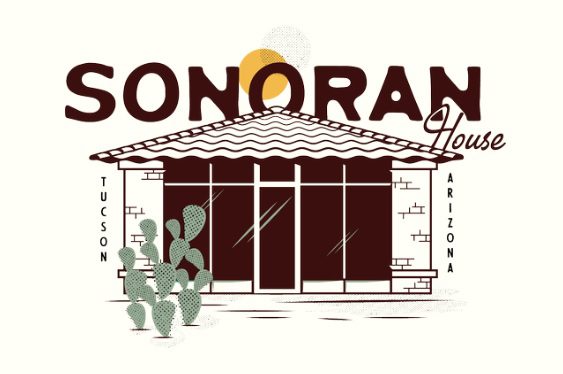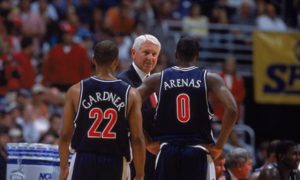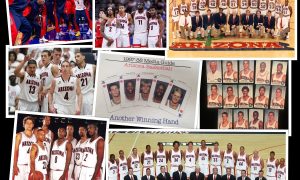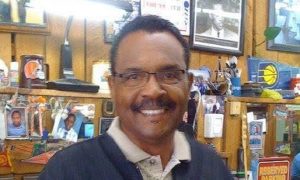He thanked his players and the fans.
In turn, the players said they loved him and the fans applauded him as they always have.
And so, there you have it — another winning day at McKale Center as it involved Lute Olson, a few of his standout players and array of fans who gave their Hall of Fame coach yet another standing ovation when UA officials unveiled a statue in his likeness.
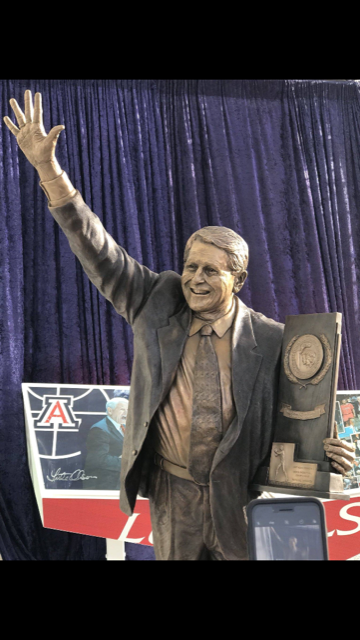
Lute’s statue at McKale Center.
“It was a great honor to be recognized by this,” Olson said, addressing some of the gathered media as he sat just a couple of feet from the national championship trophy he help bring to Arizona in 1997. “It’s been a great run.”
Great run indeed.
The man with the regal look and towering presence now has a statue of himself on the north end of McKale Center, just a few feet from the Eddie Pavilion. Those who frequent the Hall of Champions will get an easy glimpse of Lute, perhaps still the most recognizable figure in southern Arizona if not the state.
It’s what winning brings, just like a national championship, four Final Fours and a second-place finish in 2001 to Duke.
Funny thing is he brought up the runner-up finish to the Blue Devils on Thursday.
“Anytime you play Duke you’re not going to get any breaks, I’ll tell you,” he said, bringing laughs to the media talking to him.
He then added: “It was great to see all the players back (for the ceremony).”
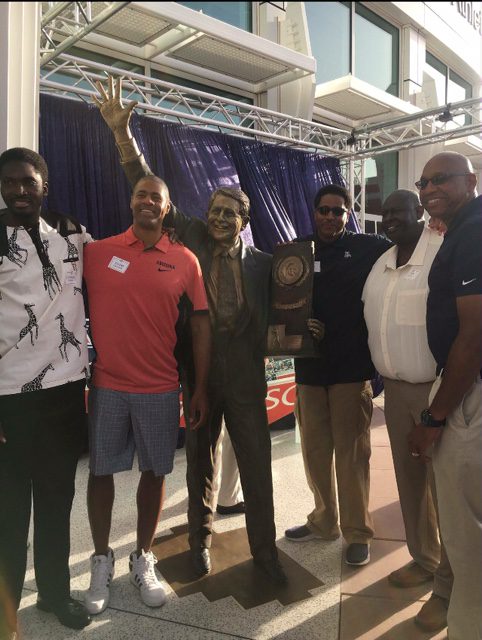
Mo Tangara, Gene Edgerson, Pete Williams, John Edgar and Joe Turner.
Those who could made it: Justin Wessel, John Edger, Harvey Thompson, Eric Meyer, Reggie Geary, Jason Stewart and Brock Brunkhorst. Matt Muehlebach, Peter Williams and Damon Stoudamire gave speeches.
Muehlebach, Williams and Stoudamire were all given instructions to speak for no more than 2 ½ minutes, but how can you wax poetic about a man they truly loved and adored? So, they didn’t. And no one got bored.
“I’ve been known that if I have to speak about coach Olson for an extended amount of time I tend to get a little emotional,” said Williams. “(For) some of my (friends) here that wouldn’t be too cool because I’d be shedding tears and everything. And I’d never hear the end of it.”
Still, he was good, talking about Lute’s impact on his life and how “moral victories would not be acceptable.”
He preached a winning attitude “and it happened here with us.”
The winning started right away and two seasons later Arizona was in the NCAA tournament. Williams and Muehlebach related stories about how hard the work was to get to that level. One included Tom Tolbert’s concern that the statue would depict Lute “yelling at him” as he was running down the court.
Yes, Tolbert was a notorious slacker … but in a good way.
Muehlebach then relayed a conversation he had with Sean Miller inquiring about Olson’s “secret sauce” to success here.
One was toughness, something Olson showed even on the court. One day illustrating a play where former UA assistant Ricky Byrdsong ran over Olson on a drill. Olson quickly got up and called “charge” and Ricky said it was a block.
“For two or three minutes they argued about that,” Muehlebach said, drawing laughter.
Muehlebach brought up Olson’s “attention to detail” saying “it was as good as I’ve ever seen.”
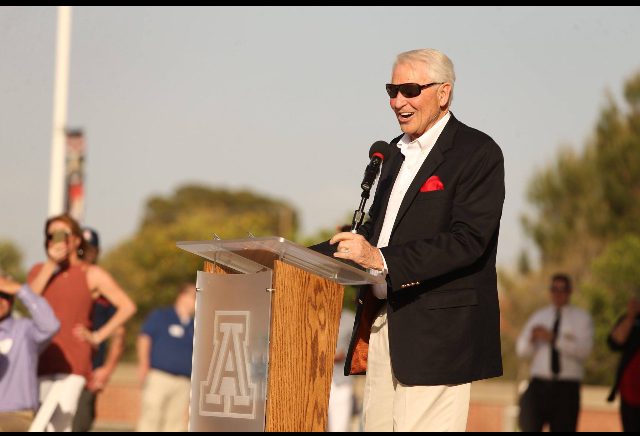
Stoudamire thanked Lute’s wife, Kelly, for taking care and loving her husband. Williams did the same. Stoudamire said he would feel bad if he didn’t mention Olson’s late wife, Bobbi, and her importance to the program for so many years.
That was important and will always remembered as such.
Stoudamire then transitioned into a story about how Olson transformed his formerly taller, bigger team into a run-and-stun one behind Khalid Reeves and himself. Olson got the two together to say he’d go smaller and faster.
“I really don’t know how this is going to work,” Stoudamire said Olson told them, “because I’ve never done it. I’ve been studying and doing some things.”
Then Stoudamire said, “Me and Khalid then (got excited) in the office because we were saying to ourselves, ‘it’s about time you figured out we were the best players.”
Yes, everyone laughed.
And that was the essence of Thursday afternoon. It was about a statue of a man they adore and the love the players had.
“The thing that will last for me is the legacy of our relationships … the players and what we meant to each other and the lineage of that,” Muehlebach said.
All because of one man, his assistants and the University of Arizona.


